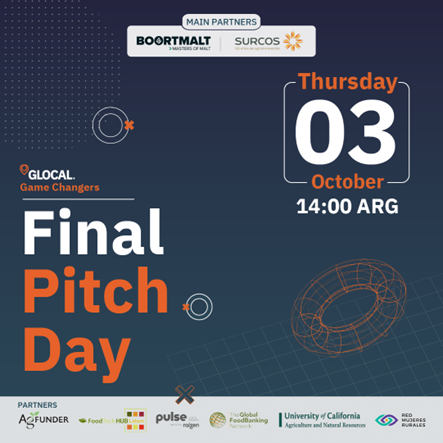Ten startups spanning everything from gene editing to farm management software will present their solutions on October 3 at the final pitch day in the GLOCAL Game Changers LatAm Series.
The startups, whittled down from more than 500 applicants, will pitch at 2pm (local time, Argentina) in front of investors, startup ecosystem enthusiasts, and program partners Boortmalt and Surcos.
The leading acceleration and investment program for agrifoodtech and climatetech startups in Latin America, the GLOCAL Game Changers LatAm Series connects startups with experts, mentors and potential advisors and enables applicants to access up to $500,000 in investment.
Run by Latam-based GLOCAL, an agrifoodtech acceleration and investment fund and certified B Corp, the Game Changers initiative targets startups at the pre-seed, seed, and pre-series A stage with full time founders that are “ready to implement impactful and disruptive innovations throughout the agrifoodtech and climatetech value chain.”
The 10 finalists are:
- BemAgro (farm management software, Brazil): Software as a Service (SaaS) startup BemAgro uses image processing with AI and computer vision to monitor crops throughout the growing cycle. Tools enable users to process data from tractors and drones to define planting, spraying and harvesting routes, detect weeds, generate variable-rate application maps and identify plant failures.
- Bigtrade (ag fintech, Brazil): Bigtrade helps connect investors to the best agribusiness opportunities, expanding access to credit for rural producers in an “easy, fast and 100% digital way.”
- Blooms (ag fintech, Mexico): Blooms offers a comprehensive financial platform for cross-border export and global payments in the produce industry.
- Calice (gene editing, Argentina): Calice combines predictive breeding technologies through its AI and a deep learning-based platform called NODES to bring new varieties to the market up to 50% faster compared to conventional breeding methods.
- Landprint (climate tech, Brazil): LandPrint helps farmers transition to regenerative agricultural practices by helping them measure and monetize environmental improvements on farm. The Landprint platform tracks biodiversity, carbon sequestration, water conservation, and soil health via remote sensing tech, lab analyses, farmers’ records, and in-field observations.
- Sticta Biologicals (biotech, Chile): Santiago-based Sticta provides at-site production of yeast derived recombinant proteins and key nutrients for the cultivated meat industry.
- Sensix (farm management software, Brazil): Founded in 2015, Sensix has developed an integrated agronomic data management platform connecting data from soil, satellites, drones, and machinery to help them make more timely decisions to optimize crop profitability.
- TRAG (ag insurance tech, Brazil): TRAG offers parametric or index-based insurance, a type of insurance policy that pays a set amount to the policyholder when a specific event occurs, rather than paying for losses incurred. For example, if rainfall falls below a certain amount during a season, the policy pays out.
- Tropicarbon (rock weathering, Colombia): Tropicarbon seeks to remove carbon at scale via enhanced rock weathering, spreading fine silicate rock dust on agricultural soils to improve soil and sequester carbon in order to generate high-quality credits.
- Zavia Bio (ag biotechnology, Argentina): An ag biotech company developing “designer biomolecules that modulate plant physiology when applied externally in small quantities” to help crops tolerate drought and other stressors.
Members of the jury include: Florencia Solari (investment officer, GLOCAL), Clara De Hertelendy (innovation and IP director, Surcos), Martín Burlo (corporate venturing and investor relations director, Surcos) and Agustín Zaffora (regional quality and innovation manager LATAM, Boortmalt).
Those interested in attending the pitch day on October 3 can register here.






